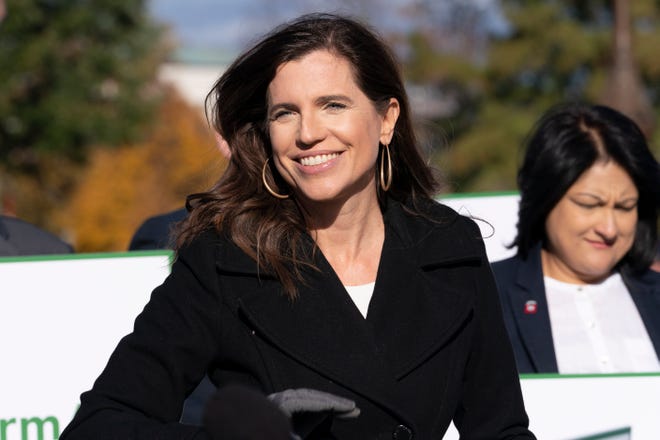COLUMBIA, S.C. (AP) — Republican Rep. Nancy Mace of South Carolina launched laws Monday to federally decriminalize marijuana, a measure she mentioned would give states freer rein to move their very own legal guidelines and laws with out worry of federal reprisals.
The measure, which Mace mentioned she hoped would garner broad GOP assist, was met instantly with criticism from conservatives in her residence state, a few of whom vowed opposition to any effort towards legalization.
In saying the invoice throughout a Washington information convention on Monday, Mace mentioned a half-dozen GOP Home members could be authentic co-sponsors of the invoice, which she mentioned would goal to control marijuana equally to alcohol and prohibit its use for anybody below 21 years of age.
Hiring folks to combat local weather change:Biden’s Build Back Better bill would give young people jobs to fight climate change. What would a new CCC look like?
Republicans who voted for infrastructure:13 House Republicans voted to pass the infrastructure bill. Here’s what their states, districts stand to get.
The measure would decriminalize marijuana on the federal degree, an obstacle cited in lots of states which have opted to not pursue legalization on their very own. However it will not change local-level restrictions, that means that states would nonetheless decide their very own marijuana statutes.

“It protects every state’s distinctive legal guidelines and reforms,” Mace mentioned. “It takes under consideration on the federal degree that each state is totally different.”
American assist for marijuana legalization has grown, underscoring a nationwide shift as extra states have embraced hashish for medical or leisure use. Based on a Gallup survey carried out earlier this 12 months, greater than two in three People supported legalizing marijuana, sustaining a record-high reached a 12 months earlier.
Based on the Nationwide Convention of State Legislatures, 36 states and 4 territories enable medical hashish use, whereas 18 states, two territories and the District of Columbia enable non-medical, grownup use.
However in South Carolina, the place lawmakers have solely handed one marijuana-related invoice, permitting prescriptions for merchandise with CBD — a hemp part that alone doesn’t trigger a “excessive” — Mace swiftly drew criticism from some conservatives over her proposal.
Mail vans are about to look totally different:Biden’s Build Back Better bill would speed up conversion to electric mail trucks at struggling USPS
Invoice goals to assist breastfeeding mothers:Some breastfeeding moms still don’t receive space or time to pump at work. Congress seems ready to help.
Calling marijuana “the primary gateway drug to the exploding opioid disaster that’s ravaging our state,” Dave Wilson, president of Palmetto Household, a conservative Christian lobbying group, warned in a press release that efforts to decriminalize marijuana “will make this disaster exponentially worse.”
Successful again Mace’s 1st District was amongst South Carolina Republicans’ prime priorities in 2020, with GOP Chairman Drew McKissick showing alongside Mace the day after she defeated U.S. Rep. Joe Cunningham.
However on Monday, McKissick swiftly launched a press release rebuking Mace’s invoice, not referencing her by identify however saying the state GOP opposed “any effort to legalize, decriminalize the usage of managed substances, and that features this invoice.”
In his personal marketing campaign for South Carolina governor, Cunningham has already launched a marijuana legalization proposal of his personal.
Mace’s proposal did garner assist from some teams, like South Carolina’s arm of People for Prosperity, a political advocacy group funded by the Koch brothers, which lauded the trouble as a “step in the fitting route” for the leeway it will give states “to find out the perfect insurance policies for hashish governance of their states.”
The measure would deal with regulation of marijuana in three silos, giving the U.S. Division of Agriculture purview over growers, whereas the U.S. Bureau of Alcohol, Tobacco, Firearms and Explosives would oversee the hashish trade. Medical marijuana could be regulated by the Meals and Drug Administration, Mace mentioned, including that she would suggest the drug be regulated equally to alcohol.
It could additionally levy a 3% federal excise tax on all hashish merchandise, proceeds from which might go to small companies, retraining regulation enforcement and psychological well being companies, amongst different companies. The measure would additionally expunge nonviolent, cannabis-only associated offenses.














